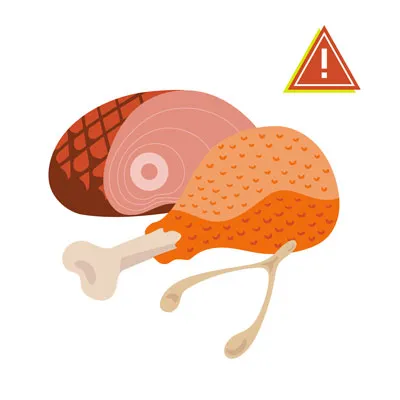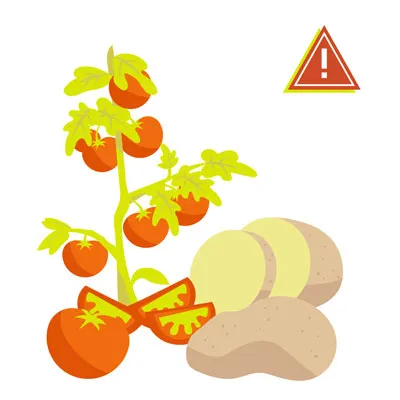As devoted pet parents, we want to share the best with our canine companions, and that often includes what we’re eating. However, not all human foods are suitable for dogs. Some common household items can be incredibly harmful, even toxic, to our furry friends. Understanding what meat dogs cannot eat is crucial for their safety and well-being. This guide will delve into the specifics of human meats and other food items that pose a risk to your dog, offering clear guidance to prevent accidental poisoning and ensure your dog thrives.
While many human foods are perfectly safe and can even be healthy additions to a dog’s diet, a significant number can cause severe illness or even be fatal. It’s estimated that over 401,500 pet poisonings occur annually in the United States, and while not all are food-related, common human foods are a major contributor. Being prepared with accurate information about what your dog can and cannot eat is essential for keeping them safe.
Understanding Why Certain Foods Are Toxic to Dogs
The fundamental reason dogs cannot safely consume certain human foods, including specific types of meat, lies in their differing digestive systems and metabolisms compared to ours. Dogs process nutrients and toxins in ways that are vastly different from humans. For instance, ingredients like theobromine and caffeine, found in chocolate, are metabolized much more slowly by dogs. This leads to a dangerous buildup in their system, potentially causing fatal consequences.
Similarly, while many fruits are safe, the pits, seeds, or stems of others can contain toxic compounds like cyanide. Even seemingly harmless items can pose a risk if the pits cause gastrointestinal obstruction due to their indigestible nature. The sensitivity to toxins can also vary based on a dog’s size, breed, and existing health conditions. Therefore, consulting with your veterinarian is always the best course of action when you have any doubts about a food item.
The Dangers of Human Meats and Other Foods for Dogs
When considering what meat dogs cannot eat, it’s important to look beyond just raw meats. Many processed, fatty, or improperly prepared meat products can be detrimental. Additionally, several other common human foods are extremely toxic and should be strictly avoided.
Meats and Meat By-Products Dogs Should Avoid
- Fatty Cuts of Meat and Meat Skin: Ham, chicken skin, turkey skin, and other high-fat meat cuts are particularly dangerous. These foods have a high fat content that can trigger acute pancreatitis, a life-threatening condition characterized by severe complications. It’s best to avoid these entirely.
- Cooked Bones: While the flesh of some animals might be safe, the bones are a significant hazard. Cooked bones are brittle and can splinter easily. If ingested, these splinters can cause internal damage, such as perforating the stomach or intestines, leading to potentially fatal abdominal infections. Bones can also cause blockages in the digestive tract.
- Raw Meat: Feeding dogs raw or undercooked meat is strongly discouraged. Raw meat can harbor harmful bacteria like Salmonella and E. coli, which can cause severe gastrointestinal issues in dogs, just as they can in humans. Beyond the risk of bacterial infection, dogs can also choke on bones present in raw meat.
 Chicken and turkey skin, ham, and other fatty cuts of meat
Chicken and turkey skin, ham, and other fatty cuts of meat
Other Common Human Foods That Are Toxic to Dogs
Beyond meat, a wide array of human foods can pose serious health risks:
- Alcohol: Even small amounts of alcohol can be highly toxic to dogs due to their smaller body size. Symptoms of alcohol poisoning can range from vomiting and breathing problems to coma and death.
- Apple, Apricot, Cherry, and Plum Seeds/Pits: While the flesh of these fruits might be safe, their seeds and pits contain cyanide. Ingesting these can lead to serious health issues, including vomiting, rapid heartbeat, seizures, and even death. The pits themselves can also cause digestive blockages.
- Avocado: Avocados contain a substance called persin, which can cause gastrointestinal upset in dogs. Furthermore, the large pit poses a significant choking hazard and can lead to intestinal obstruction.
- Broccoli: In large quantities, broccoli can be harmful due to isothiocyanates. While small amounts might be acceptable occasionally, it’s safer to avoid it, as the stalks can also become lodged in a dog’s throat.
- Caffeine and Coffee Grounds: Caffeine, found in coffee, tea, and energy drinks, can cause dangerous symptoms like rapid heartbeat, tremors, seizures, and irregular heart rhythms. Coffee grounds and tea bags are especially concentrated sources.
- Chocolate: This is one of the most well-known toxins. Chocolate contains theobromine and caffeine, which dogs metabolize poorly. The darker and more bitter the chocolate, the higher the concentration of these harmful substances. Symptoms can include vomiting, diarrhea, hyperactivity, pancreatitis, abnormal heart rhythm, and seizures.
- Grapes and Raisins: These fruits are highly toxic and can cause sudden kidney failure in dogs, even in small quantities. Vomiting, diarrhea, loss of appetite, and changes in urination are common signs of poisoning.
- Macadamia Nuts, Almonds, and Pistachios: Macadamia nuts are particularly dangerous, causing weakness, vomiting, and tremors. While other nuts like almonds and pistachios may not be directly toxic, they can pose choking hazards or be problematic if seasoned.
- Milk and Dairy Products: Many dogs are lactose intolerant and cannot properly digest dairy products, leading to gas, diarrhea, and upset stomachs. High-fat dairy like ice cream can also contribute to pancreatitis.
- Mushrooms: Wild mushrooms can be highly poisonous, causing a range of severe symptoms including liver and kidney failure, vomiting, diarrhea, and even hallucinations. It’s best to avoid all mushrooms unless specifically identified as safe by an expert.
- Nutmeg and Cinnamon: Nutmeg can cause hallucinations and severe vomiting due to its myristicin content. Cinnamon, while not toxic, can irritate a dog’s mouth and potentially lead to low blood sugar.
- Onions, Garlic, Chives, and Leeks: These members of the allium family contain compounds that can damage a dog’s red blood cells, leading to anemia. This risk is present whether they are raw, cooked, or in powdered form. Certain dog breeds are particularly sensitive.
- Salt: Excessive salt intake can disrupt a dog’s fluid balance, leading to tremors, seizures, diarrhea, and even coma.
- Spicy Food: Spicy human foods can cause significant gastrointestinal distress, including vomiting, stomach ulcers, and diarrhea.
- Sugar-Free Gum and Candy (Xylitol): Xylitol is an artificial sweetener found in many sugar-free products. In dogs, it can cause a rapid and dangerous drop in blood sugar, leading to weakness, seizures, and potentially liver failure. Even small amounts can be lethal.
- Tomatoes and Raw Potatoes: While ripe tomatoes and cooked potatoes (without additives) can be safe in moderation, the green parts of the tomato plant and raw potatoes contain solanine, which is toxic to dogs.
- Tobacco: Nicotine in tobacco products is highly toxic to dogs, causing symptoms such as vomiting, diarrhea, rapid breathing, agitation, and in severe cases, seizures, coma, and death.
- Yeast and Raw Dough: Raw dough can expand in a dog’s stomach, causing severe pain and potentially life-threatening torsion. Furthermore, the yeast ferments, producing alcohol and leading to alcohol poisoning.
- Rhubarb and Star Fruit: Both contain soluble calcium oxalate crystals, which can bind with calcium in the body, leading to dangerous drops in calcium levels and potential kidney failure.
 Tomatoes and raw potatoes
Tomatoes and raw potatoes
What Dogs Are Most at Risk?
While all dogs should be protected from toxic foods, certain groups are more vulnerable:
- Small Breeds: Due to their lower body weight, small dogs are disproportionately affected by toxins, meaning even small amounts of dangerous substances can have severe consequences.
- Puppies: Young dogs have developing digestive and immune systems, making them more susceptible to the harmful effects of toxins and even certain food contaminants.
- Elderly Dogs: Older dogs may have compromised health or pre-existing conditions that make them more vulnerable to the effects of toxic foods.
- Dogs with Pre-existing Conditions: Dogs already managing health issues like diabetes, kidney disease, or heart conditions are at a significantly higher risk when exposed to toxic substances.
Preventing Your Dog from Eating Toxic Foods
Proactive measures are key to ensuring your dog’s safety:
- Secure Storage: Always store potentially harmful foods out of your dog’s reach. Use high shelves, secure cabinets, or airtight containers.
- No Feeding from Your Plate: Resist the urge to share your meals or offer treats directly from your plate. This habit can encourage begging and make it harder to control what your dog consumes. Stick to commercially prepared dog treats.
- Educate Everyone: Ensure all family members, including children, and any guests understand the importance of not feeding your dog human food, especially items known to be toxic.
- Holiday Vigilance: During holidays, when food is abundant and routines can be disrupted, be extra cautious. Ensure countertops are clear and that your dog cannot access dropped scraps or unattended dishes.
What to Do If Your Dog Eats Something Toxic
If you suspect your dog has ingested a toxic food, immediate action is critical:
- Contact Professionals Immediately: Call your veterinarian or a pet poison control center without delay. Prompt treatment significantly improves the chances of a successful outcome and reduces the length of any necessary hospitalization.
- Provide Essential Information: Be prepared to tell the professional what food was consumed, the estimated amount, and the time of ingestion.
- Avoid Home Remedies: Do not attempt to induce vomiting or administer any home remedies unless specifically advised by your veterinarian. Some remedies can be harmful depending on the ingested substance.
By understanding the risks associated with human foods, particularly what meat dogs cannot eat and other common toxins, you can take effective steps to protect your beloved canine companion. Always prioritize their health and consult your veterinarian if you have any concerns.
References
- “Top 10 dog poisons,” Hilary Parker (5/2023), WebMD, https://www.webmd.com/pets/dogs/top-10-dog-poisons
- “What happens if a dog eats chocolate?” (10/2023), Colorado State University, https://vetmedbiosci.colostate.edu/vth/animal-health/why-is-chocolate-bad-for-dogs/
- “Fruits and vegetables dogs can or can’t eat,” (3/2024), American Kennel Club, https://www.akc.org/expert-advice/nutrition/fruits-vegetables-dogs-can-and-cant-eat/
- “What to do if your dog drinks alcohol,” Jerry Klein (7/2023), American Kennel Club, https://www.akc.org/expert-advice/vets-corner/is-alcohol-dangerous-for-dogs/
- “Can dogs eat apples?” Hector Joy (12/2022), PetMD, https://www.petmd.com/dog/general-health/can-dogs-eat-apples
- “Can dogs eat plums?” Katie Koschalk (7/2023), Chewy, https://be.chewy.com/nutrition-pet-diet-tips-can-dogs-eat-plums/
- “Avocado (Persea spp) Toxicosis in Animals,” Cristine Hayes (9/2024), Merck Veterinary Manual, https://www.merckvetmanual.com/toxicology/food-hazards/avocado-persea-spp-toxicosis-in-animals
- “People foods to avoid feeding your pets,” (n.d.), ASPCA, https://www.aspca.org/pet-care/animal-poison-control/people-foods-avoid-feeding-your-pets
- “People foods dogs can and can’t eat,” (3/2024), American Kennel Club, https://www.akc.org/expert-advice/nutrition/human-foods-dogs-can-and-cant-eat/
- “Can dogs eat nuts?” Amanda Ardente (1/2023), PetMD, https://www.petmd.com/dog/nutrition/can-dogs-eat-nuts
- “Can dogs drink milk?” Sandra C. Mitchell (1/2024), PetMD, https://www.petmd.com/dog/nutrition/can-dogs-drink-milk
- “Can dogs have nutmeg?” Barri J. Morrison (11/2023), PetMD, https://www.petmd.com/nutmeg-safe-dogs
- “Onion, garlic, chive, and leek poisoning in dogs,” Renee Schmid et al. (2024), VCA Animal Hospitals, https://vcahospitals.com/know-your-pet/onion-garlic-chive-and-leek-toxicity-in-dogs
- “Can dogs eat tomatoes?” Anna Burke (10/2024), American Kennel Club, https://www.akc.org/expert-advice/nutrition/can-dogs-eat-tomatoes/
- “Can dogs eat potatoes?” Katherine Ripley (11/2023), American Kennel Club, https://www.akc.org/expert-advice/nutrition/can-dogs-eat-potatoes/
- “What to do if your dog eats a cigarette butt,” (6/2023), American Kennel Club, https://www.akc.org/expert-advice/health/dog-ate-cigarette-butt/
- “Dough & dogs: Why it’s bad and what you can do,” Lisa Goldstein (7/2024), Preventive Vet, https://www.preventivevet.com/dogs/dough-is-toxic-to-dogs
- “Rhubarb,” (n.d.), Pet Poison Helpline, https://www.petpoisonhelpline.com/poison/rhubarb/
- “Can dogs drink carbonated water?” Heather Logue (n.d.), Rover, https://www.rover.com/blog/can-dogs-drink-carbonated-water/
- “What fruits can dogs eat?” Ellen Malmanger (2/2024), PetMD, https://www.petmd.com/dog/nutrition/what-fruits-can-dogs-eat
- “Can dogs have green beans?” Anna Burke (8/2022), American Kennel Club, https://www.akc.org/expert-advice/nutrition/can-dogs-have-green-beans/
- “About pet food safety,” (4/2024), CDC, https://www.cdc.gov/healthy-pets/about/pet-food-safety.html
